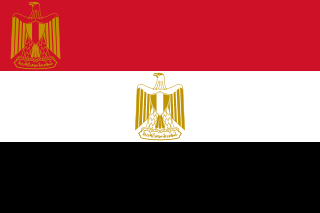
The President of the Arab Republic of Egypt is the executive head of state of Egypt and the de facto appointee of the official head of government under the Egyptian Constitution of 2014. Under the various iterations of the Constitution of Egypt following the Egyptian Revolution of 1952, the president is also the supreme commander of the Armed Forces, and head of the executive branch of the Egyptian government. The current president is Field Marshal Abdel Fattah el-Sisi, who has been in office since 8 June 2014.

The president of Pakistan is the head of state of the Islamic Republic of Pakistan. The president is the nominal head of the executive and the supreme commander of the Pakistan Armed Forces. Arif Alvi is the 13th and current president, in office since 9 September 2018.

The National Assembly is the unicameral legislature of Kuwait. The National Assembly meets in Kuwait City. Because political parties are illegal in Kuwait, candidates run as independents. The National Assembly is made up of 50 elected members and 16 appointed government ministers.

The prime minister of Pakistan is the head of government of the Islamic Republic of Pakistan. Executive authority is vested in the prime minister and his chosen cabinet, despite the president of Pakistan serving as the nominal head of executive. The prime minister is often the leader of the party or the coalition with a majority in the lower house of the Parliament of Pakistan, the National Assembly where he serves as Leader of the House. Prime minister holds office by virtue of their ability to command the confidence of the National Assembly. The prime minister is designated as the "Chief Executive of the Islamic Republic".
Dissolution of a legislative assembly is the simultaneous termination of service of all of its members, in anticipation that a successive legislative assembly will reconvene later with possibly different members. In a democracy, the new assembly is chosen by a general election. Dissolution is distinct on the one hand from abolition of the assembly, and on the other hand from its adjournment or prorogation, or the ending of a legislative session, any of which begins a period of inactivity after which it is anticipated that the same members will reassemble. For example, the "second session of the fifth parliament" could be followed by the "third session of the fifth parliament" after a prorogation, but would be followed by the "first session of the sixth parliament" after a dissolution.
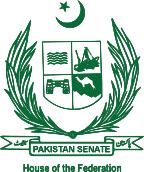
The Senate of Pakistan or Aiwān-e-Bālā Pākistān, constitutionally the House of the Federation, is the upper house of the bicameral Parliament of Pakistan. As of 2023, It has a maximum membership of 100, of which 92 are elected by the provincial legislatures using single transferable vote. Four represent the Federal Capital and another four are representing former Federally Administered Tribal Areas, until membership expiration in 2024. Members sit for terms lasting six years, with half of the house up for election every three years. Unlike the National Assembly, the Senate is a continuing chamber and hence not subject to dissolution.

The National Assembly of Pakistan is the lower house of the bicameral Parliament of Pakistan, with the upper house being the Senate. As of 2023, the National Assembly has a maximum membership of 342, of which 266 are directly elected by an adult universal suffrage and a first-past-the-post system to represent their respective constituencies, while 70 are elected on reserved seats for women and religious minorities from all over the country and six on reserved seats for former Federally Administered Tribal Areas, and the members hold their seats for five years or until the house is dissolved by the President on the advice of the Prime Minister. The house convenes at the Parliament House, Red Zone, Islamabad.

The Parliament of Pakistan is the supreme legislative body of the Islamic Republic of Pakistan. It is a bicameral federal legislature, composed of the President of Pakistan and two houses: the Senate and the National Assembly. The president, as head of the legislature, has the power to summon or prorogue either house of the Parliament. The president can dissolve the National Assembly, only on the Prime Minister's advice.

There are three types of elections in Nepal: elections to the Federal Parliament, elections to the provincial assemblies and elections to the local government. Within each of these categories there may be by-elections as well as general elections. Currently three electoral systems are used: parallel voting for House of Representatives and provincial assemblies, Single transferable vote for National Assembly and first past the post for local elections.

Since its establishment in 1947, Pakistan has had an asymmetric federal government and is a federal parliamentary democratic republic. At the national level, the people of Pakistan elect a bicameral legislature, the Parliament of Pakistan. The parliament consists of a lower house called the National Assembly, which is elected directly, and an upper house called the Senate, whose members are chosen by elected provincial legislators. The head of government, the Prime Minister, is elected by the majority members of the National Assembly and the head of state, the President, is elected by the Electoral College, which consists of both houses of Parliament together with the four provincial assemblies. In addition to the national parliament and the provincial assemblies, Pakistan also has more than five thousand elected local governments.

The House of Representatives, or Pratinidhi Sabha, is one of the houses of the Federal Parliament of Nepal, with the other house being the National Assembly. Members of the House of Representatives are elected through a parallel voting system. They hold their seats for five years or until the body is dissolved by the President on the advice of the council of ministers. The house meets at the International Convention Centre in Kathmandu.

The National Assembly is the sole legislative body of Botswana's unicameral Parliament, of which consists of the President and the National Assembly. The House passes laws, provides ministers to form Cabinet, and supervises the work of government. It is also responsible for adopting the country's budgets. It is advised by the Ntlo ya Dikgosi, a council of tribal chiefs which is not a house of Parliament.

The House of Assembly of Barbados is the lower house of the bicameral Parliament of Barbados. It has 30 Members of Parliament (MPs), who are directly elected in single member constituencies using the simple-majority system for a term of five years. The House of Assembly sits roughly 40–45 days a year and is presided over by a Speaker.

The National Assembly is one of the two components of the Parliament of Guyana. Under Article 51 of the Constitution of Guyana, the Parliament of Guyana consists of the president and the National Assembly. The National Assembly has 65 members elected using the system of proportional representation. Twenty five are elected from the ten geographical constituencies and forty are awarded at the national level on the basis of block votes secured, using the LR-Hare Formula as prescribed by the elections Laws (Amendment) Act 15 of 2000.
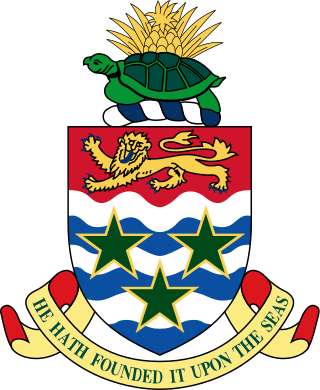
The Parliament of the Cayman Islands is the unicameral legislature of the British Overseas Territory of the Cayman Islands. It is composed of 21 members; 19 elected members for a four-year term and two members ex officio.

The president of the Republic of Artsakh was the head of state and head of government of the de facto Republic of Artsakh.

General elections were held in Barbados on 21 February 2013. They were the first post-independence elections where the election date was announced five years after the last general election. The ruling Democratic Labour Party was re-elected with a reduced majority, winning 16 of the 30 seats in the House of Assembly.
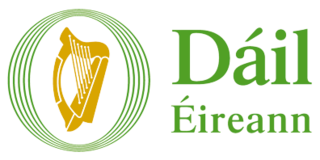
Dáil Éireann is the lower house, and principal chamber, of the Oireachtas, which also includes the President of Ireland and Seanad Éireann. It consists of 160 members, each known as a Teachta Dála. TDs represent 39 constituencies and are directly elected for terms not exceeding five years, on the system of proportional representation by means of the single transferable vote (PR-STV). Its powers are similar to those of lower houses under many other bicameral parliamentary systems and it is by far the dominant branch of the Oireachtas. Subject to the limits imposed by the Constitution of Ireland, it has power to pass any law it wishes, and to nominate and remove the Taoiseach. Since 1922, it has met in Leinster House in Dublin.
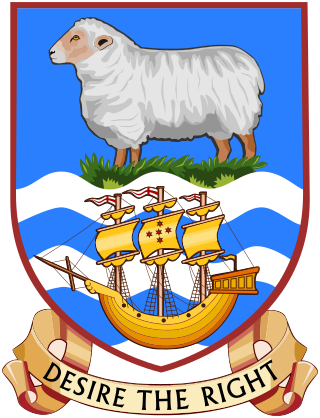
The next Falkland Islands general election will elect all eight members of the Legislative Assembly through universal suffrage using block voting, with the Chief Executive of the Falkland Islands acting as returning officer. It will be the fifth election since the new Constitution came into force replacing the Legislative Council with the Legislative Assembly.

General elections will be held in Botswana in 2024 to determine the composition of the 13th Parliament of Botswana as well as local councils across the country. Up for election are 61 seats of the unicameral National Assembly as well as 490 local council seats, all elected through the first-past-the-post voting system. Ever since the first election in 1965, the Botswana Democratic Party has held a majority of seats in the National Assembly and thus governed alone for 57 years without interruption, making Botswana a dominant-party system.



















